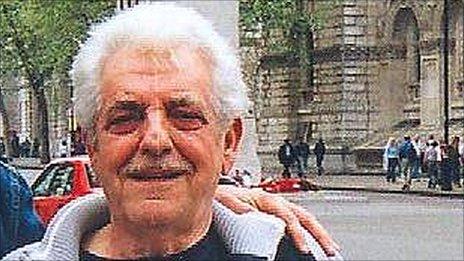Chris McGlade: How I forgave my dad's killer - and made it funny
- Published
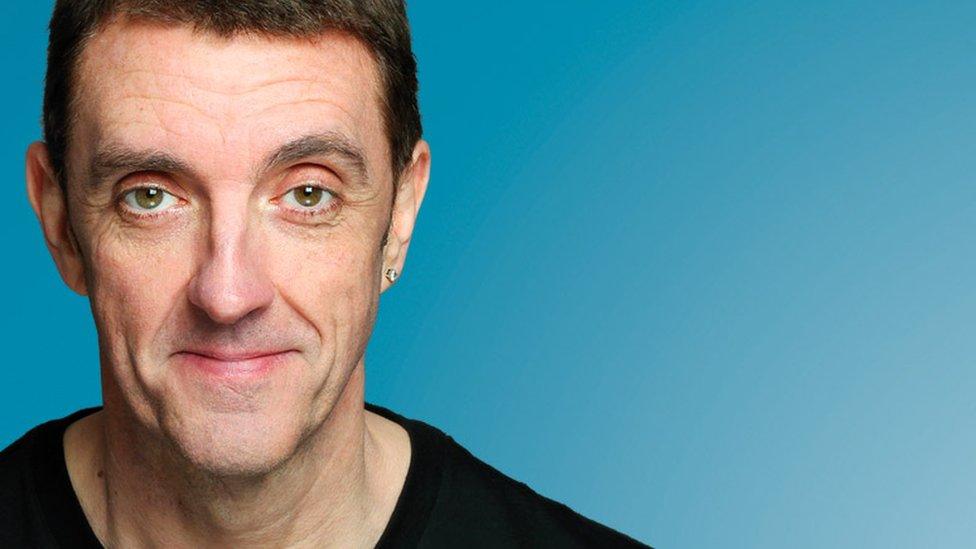
Comedy is often seen as a useful way to tackle thorny topics but Chris McGlade has gone the extra mile with his stand-up show Forgiveness - about his father's murder, in 2011.
His father, Terry, was murdered in his own home by a friend he had taken in.
"I remember when the police came and told me my dad had been strangled to death and set on fire," the comic says, from his home, in Redcar, Teesside.
"It was a shock because I thought he'd just been killed in the fire," he says quietly.
The man who murdered Terry, 77, was jailed for life, external.
"His murderer was alcoholic and he was homeless," Chris says.
"He had a job delivering pizzas and he lost his job - that's how he came to be at Dad's house, because he wanted somewhere to stay and Dad said yes."
Terry would not give the man staying with him any alcohol, or the keys to his car. The scenes that followed resulted in his death.
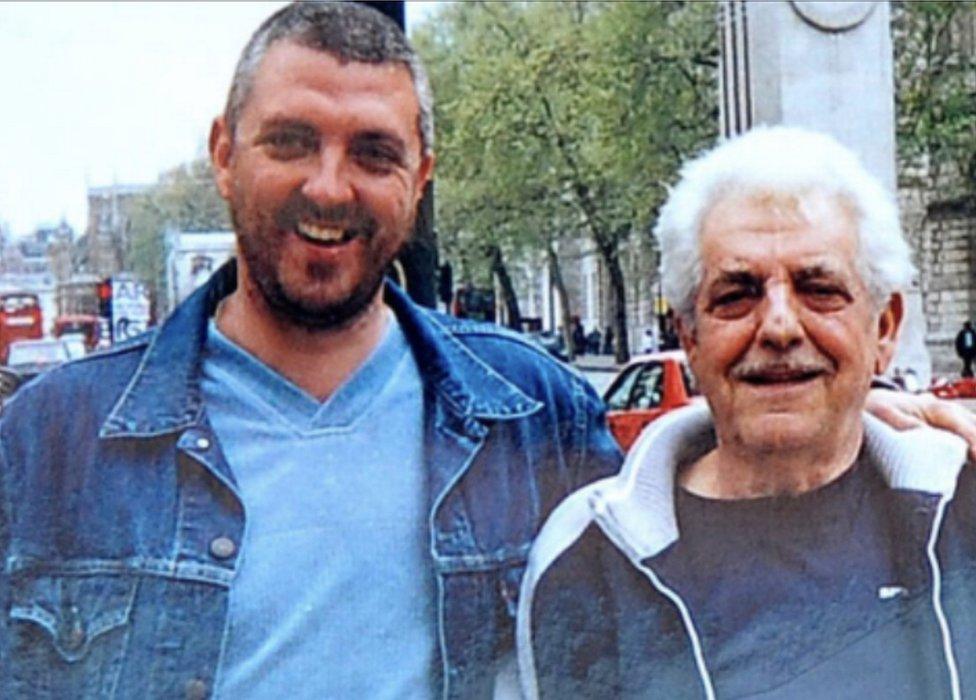
Happier times: Chris and Terry McGlade
Many in Chris's position would feel nothing but rage towards his father's murderer - he took a different path.
"It's a very personal thing," he says.
"When we were told my dad had been murdered, my forgiveness was more or less like an instinctive thing.
"For some people it takes a while. For some it's instant. Some people don't find it at all."
He recalls talking with the officers who broke the news, at his home.
"I said, 'Well, I don't know what to do now,'" Chris says.
"And the detective said, 'What do you mean you don't know what to do?'
"I told him, 'Well, I don't know whether to get him buried or cremated - because that's important, you know.
"'They always say if your loved ones get cremated, you're supposed to scatter the ashes around somewhere they used to like going - I don't think they'd be too happy at the cheap-meat counter at Aldi.'"
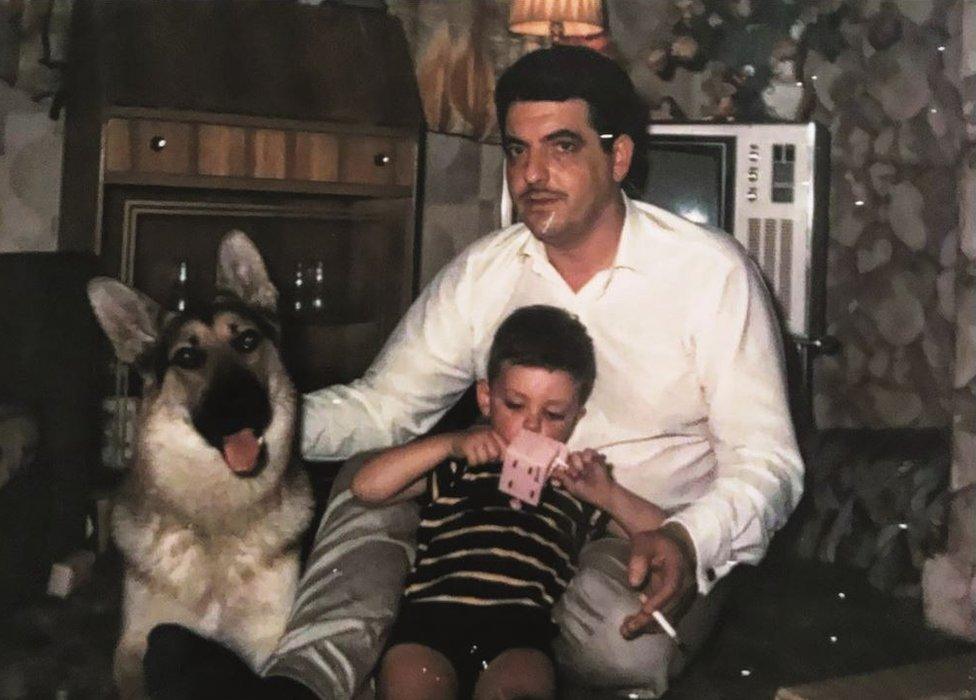
Chris with his father and a family pet
He was "laughing in the policemen's faces, through tears, which is a strange thing", Chris says.
"My wife said, 'It's just his way,' and she was right," he says.
"It was my way - but it was also my family's way and my father's way."
His family has always had a "very irreverent sense of humour", Chris says, and an "if you don't laugh, you'll cry attitude".
"That's how I was brought up," he says.
And in the precise moment when he was laughing, he chose forgiveness.
"I could feel my dad around me," Chris says.
"I just felt it. It was just so right. There was just a flow with everything.
"The anger had been threatening to take me over.
"In all that laughter and all that light, I managed to rise above the anger that had been clicking at my heels.
"I felt it was right to rise above that force, that anger that was trying to pull me back.
"I didn't want to be that kind of resentful or bitter person."
Chris remained deeply affected, however.
Seven years later, performing to a full house in the cellar of a small venue at the Edinburgh Festival, he had a panic attack, ran off stage, back to his digs, and wrote a poem, Blood Beneath Your Nails, about the evidence that had helped prove his father had been murdered.
"It was about Dad's trial, at court," Chris says.

Chris is proud his shows bring diverse groups of people together
The next day, he decided to write a show about the murder, as a way of processing it.
At first, he was unsure how to find comedy in such troubling subject matter.
But having started out in tough, sometimes violent working-men's clubs, he had years of experience to draw on and decided he would try to weave some of this "working-men's club humour" into more "thought-provoking, thinking-man's middle-class comedy".
The show is also about Chris's childhood, in north-east England.
"It's a very working-class tale and it defends working-class life," he says.
Choking up
Previews, in 2019, received positive reviews, with the Scotsman, external calling Forgiveness "a unique experience" with "big, old-fashioned, belly-laughs" and the Telegraph saying it was "one of the most enjoyable and life-affirming hours on the [Edinburgh Festival] Fringe".
And early 2020 saw one of Chris's proudest moments - performing the show at Soho Theatre, external, which showcases new talent, "one of the most cutting-edge theatres in London", he says.
The theatre described the show as Chris "attempting to lay to rest the ghosts that have haunted him".
And he smiles with pride, choking up as he recalls the audience of "black, white, Asian, old, young, male, female, middle- and working-class people", a legacy of which his father would have been proud.
'Discriminated against'
Another of Chris's poems, The Right to Hate, reads: "Don't naturally assume I'm thick and racist because I'm northern working class. I'm not. I'm articulate, sharp and bright."
"Working-class people are terribly discriminated against," he says.
"And now I feel like crying, because that's the divide that nobody wants to talk about in this country."
"Talk about racism, gender and division is... setting one against the other.
"The whole Brexit issue really showed up discrimination towards working-class people... because they hadn't bought into the way that that middle-class progressive culture expected."

Forgiveness is returning to this year's Edinburgh Festival
The theatre asked Chris to remove some "racial slurs" from Forgiveness, which were "working-class slang and not used out of malice", he says.
And although he agreed, an "anti-Semitic" reference in his poem meant the theatre did not rebook him after lockdown, external.
It was a "journey of discovery", he says.
After one show, two Israeli Advocacy Movement members told him: "You've made us see that people could say anti-Semitic things but not be anti-Semitic. They could say them out of a lack of education."
"And I cried and I hugged those two guys and they hugged me," Chris says.
He adds it was possible to find a different way of "saying the things I wanted to say in the show, while "taking the Mickey out of being censored".
Forgiveness is now up and running again, and touring the UK.
'I love the acceptance'
Chris sees his whole life as a learning process, with this experience as part of it.
"I hope I learn something new on my deathbed," he says.
"If I am growing, evolving and getting better all the time, then that means that my life - even on the day I pop my clogs - hasn't been for nothing."
And he will continue doing comedy because "I love it - I love the acceptance, because I love to see people laugh".
"When I was a kid, I was bullied all the way through my childhood," Chris says. "And every time I get a laugh, the little lad who used to get a smack in the face gets a pat on the head.
"That's what drives me on."
Chris McGlade is performing his Forgiveness Tour, external until 18 September.
Related topics
- Published4 October 2019
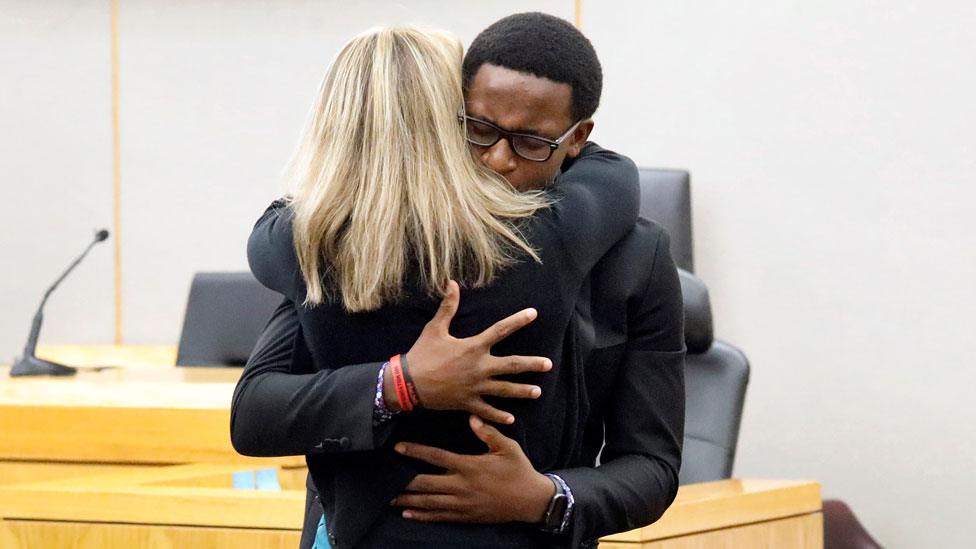
- Published20 August 2013
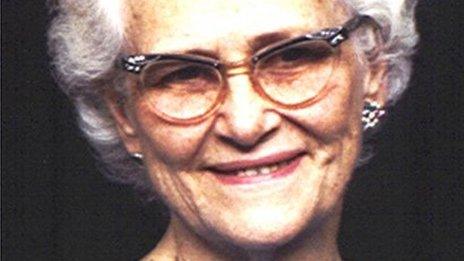
- Published22 April 2011

- Published14 July 2011
